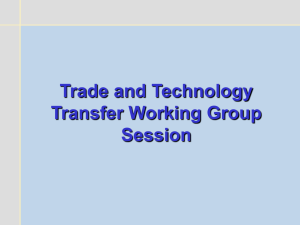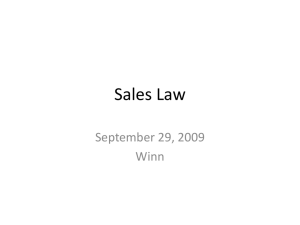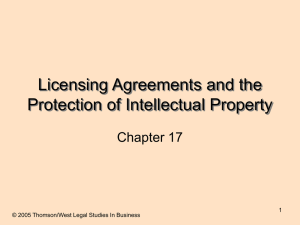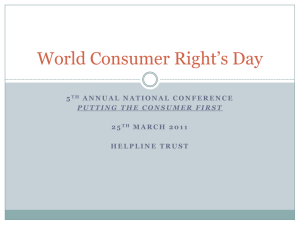ITU Workshop: “ICT Standards and Intellectual Property Rights” (Geneva, 1 July 2008) Meeting Report The ITU Workshop: “ICT Standards and Intellectual Property Rights” organized by the ITU
advertisement
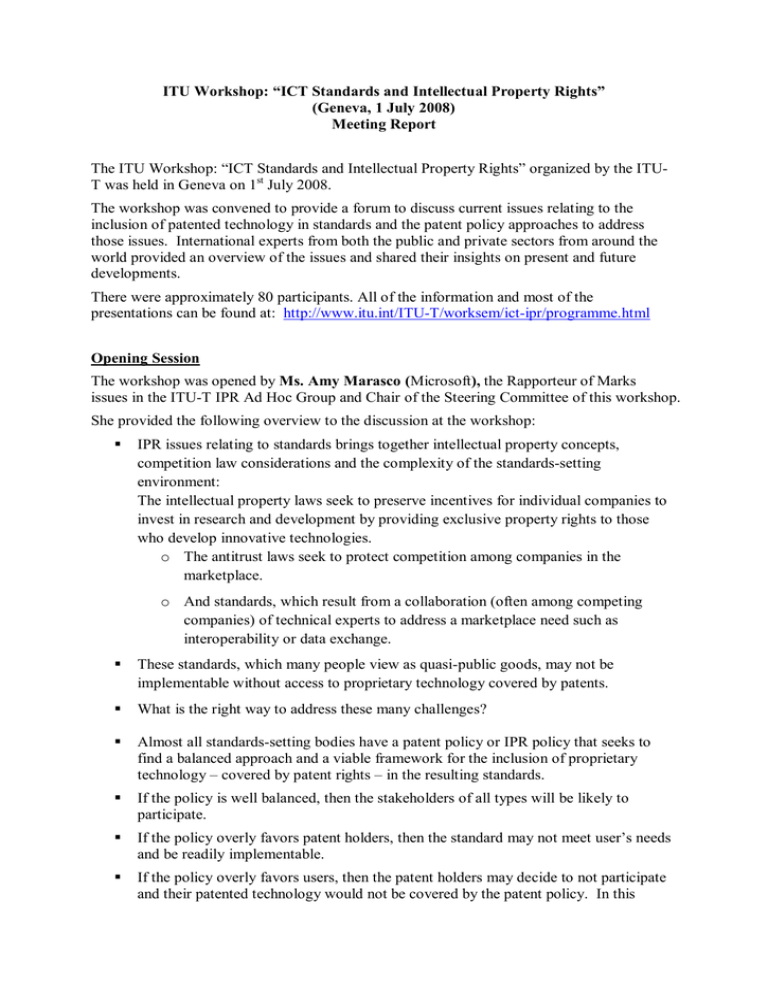
ITU Workshop: “ICT Standards and Intellectual Property Rights” (Geneva, 1 July 2008) Meeting Report The ITU Workshop: “ICT Standards and Intellectual Property Rights” organized by the ITU­ T was held in Geneva on 1 st July 2008. The workshop was convened to provide a forum to discuss current issues relating to the inclusion of patented technology in standards and the patent policy approaches to address those issues. International experts from both the public and private sectors from around the world provided an overview of the issues and shared their insights on present and future developments. There were approximately 80 participants. All of the information and most of the presentations can be found at: http://www.itu.int/ITU­T/worksem/ict­ipr/programme.html Opening Session The workshop was opened by Ms. Amy Marasco (Microsoft), the Rapporteur of Marks issues in the ITU­T IPR Ad Hoc Group and Chair of the Steering Committee of this workshop. She provided the following overview to the discussion at the workshop: § IPR issues relating to standards brings together intellectual property concepts, competition law considerations and the complexity of the standards­setting environment: The intellectual property laws seek to preserve incentives for individual companies to invest in research and development by providing exclusive property rights to those who develop innovative technologies. o The antitrust laws seek to protect competition among companies in the marketplace. o And standards, which result from a collaboration (often among competing companies) of technical experts to address a marketplace need such as interoperability or data exchange. § These standards, which many people view as quasi­public goods, may not be implementable without access to proprietary technology covered by patents. § What is the right way to address these many challenges? § Almost all standards­setting bodies have a patent policy or IPR policy that seeks to find a balanced approach and a viable framework for the inclusion of proprietary technology – covered by patent rights – in the resulting standards. § If the policy is well balanced, then the stakeholders of all types will be likely to participate. § If the policy overly favors patent holders, then the standard may not meet user’s needs and be readily implementable. § If the policy overly favors users, then the patent holders may decide to not participate and their patented technology would not be covered by the patent policy. In this situation, there are no rules at all that would help enable implementers to have access to that technology. § Most standards bodies use some type of RAND policy pursuant to which patent holders are encouraged to disclose their necessary patents and make commitments to license those patents under reasonable and non­discriminatory licensing terms. § The objective of these policies is to encourage the contribution of innovative technology to the standards development process so that that technology can be widely implemented in the industry. These policies enable all of the implementers in the industry – including competitors – to have access to this new technology. § At the same time, there is a need to respect the fact that companies make large investments in developing that patented technology and therefore they should be able to license it under reasonable terms (as opposed to forcing them to share it for free or in an unrestricted manner). o Very often in the many ongoing policy debates there arguably is not enough consideration given to the impact of a new, proposed policy approach on incentives for companies to innovate. o Innovation and IP protection is one of the key cornerstones for economic growth, and it is critical to enhancing societal benefits. § But while there is quite a bit of agreement that there needs to be a balanced approach to creating frameworks for the inclusion of IPR in standards, there are many different views as to how this balance should be accomplished. Mr. Malcolm Johnson (Director of the Telecommunication Standardization Bureau) welcomed participants. He remarked that: The objective of ITU is to ensure compatibility and interoperability of technologies and systems on a worldwide basis. This is especially important in today’s rapidly evolving information and communication technology sector. To ensure the use of Recommendations and their applications, it is important that patents that are necessary to implement the Recommendations are identified as early as possible and are made available for licensing by any implementer. Then he briefly touched on the history within ITU of how patents have been addressed. He remarked on the the need for standards bodies to collaborate with each other in the face of increasing convergence of technologies. ITU­T placed great emphasis on the need for collaboration and it will be an issue to be discussed at the Global Standardization Symposium in Johannesburg on 20 October this year, preceding the World Telecommunication Standardization Assembly. Finally, he emphasized that the ITU strongly encourages other standards developers, including forums and consortiums, to adopt a similar IPR policy to the Common Patent Policy so that continued collaboration and convergence of technology can occur with greater efficiency. Session 1: Governments’ Perspectives on Standards and IPR Policy Issues Coordinator: Mr. Serge Raes (France Telecom), the Rapporteur of Patent Issues in the ITU­T IPR Ad Hoc Group Mr. Sean Gates (Morrison & Foerster) addressed the U.S. antitrust enforcement agency perspectives on IPR policies by explaining underlying principles and views regarding disclosure obligations and licensing commitment. Ms. Qishan Zhao (Shanghai University) pointed out three functions that the government should assume, and introduced Chinese government’s actions regarding the IPR and standards which seeks to address the particular market situation and with special attention to the domestic standardization system. Mr. Yukio Hiramatsu (Osaka Institute of Technology) outlined the Japan’s IP strategy programme for 2007 and activities carried out by Intellectual Property policy headquarters under the Prime Minister. Mr. Victor Vazquez Lopez (WIPO) and Ms. Tomoko Miyamoto (WIPO) presented WIPO's perspectives on the relationship between IPRs and standards, and highlighted fora and seminars that WIPO has organized in the past and future. Session 2: PTO perspectives on Standards and IPR Issues Coordinator: Mr. Kishik Park (Electronics and Telecommunications Research Institute (ETRI)) Mr. Michel Goudelis (European Patent Office (EPO)) presented the possible measures to be taken to improve the interface between standard setting organizations and patent examining authorities so as to increase the reliability of patents granted in the standard related examination field and to increase transparency in the use of patents in ICT fields. Mr. Konstantinos Karachalios (European Patent Office (EPO)) overviewed the possible evolution of the relationship between standards and their patents toward the middle of the 21 st century through the lens of four EPO scenarios. Session 3: Standards­setting bodies’ Perspectives on Standards and IPR Issues Coordinator: Mr. Keith Chu (Teridian), the Rapporteur of Software Copyright issues in the ITU­T IPR Ad Hoc Group Mr. Paul Vishny (Telecommunications Industry Association (TIA, USA)) outlined TIA’s standards program, TIA’s standardization rules and policies, its patent policy, and its position on “Open Standards’. Steven M. Mills (IEEE, USA) presented the IEEE’s new patent policy approved in December 2006 which included several enhancements to the basic RAND­based approach. He also explained some observations after the first year of implementation and wrapped up with a discussion of points to consider when looking at an IPR policy revision. Mr. Michael Fröhlich (European Telecommunications Standards Institute (ETSI)) gave presentation on ETSI’s IPR policy and how ex ante disclosure is being addressed at ETSI. Mr. Yukio Hiramatsu (Telecommunication Technology Committee (TTC, Japan)) introduced IPR activities of TTC and briefly explained the current status of TTC’s IPR handling. Mr. Jongbong Park (Telecommunications Technology Association of Korea (TTA, Korea)) presented the ICT standardization committees of TTA, TTA IPR policy, IPR handling process, and ongoing issues under discussion. Mr. Jose Checa (International Organization for Standardization (ISO)) reported the impact of patents in the ICT standardization work undertaken by ISO and IEC technical committees. He also compared the Common Patent Policy for IEC, ISO and ITU with ISO/IEC's former policy. Mr. Antoine Dore (ITU) overviewed the legal aspects of the ITU’s standardization activities, the ITU’s approach toward patents, and introduced possible improvements to the patent guidelines that are under discussion in the ITU­T IPR Ad Hoc Group. Wrap­Up Session The assembled international experts, representing public and private sector interests, provided many timely insights into the issues surrounding the intersection of standards, intellectual property and competition law. Many participants expressed the view that the workshop was very valuable, and they believe that further workshops and discussion of the issues may be helpful. As articulated by the Workshop Chairman, there were five general themes that were reflected in the presentations and discussions during the workshop: 1. Standards­setting IPR Policies Generally · A common theme throughout the workshop was the need to seek a balanced approach to IPR or patent policies. These stakeholders include patent holders, implementers and the standards bodies themselves. · How should balance be defined? There is no one­size­fits all approach. ISO/IEC/ITU succeeded in adopting a harmonized approach, but this was not an easy exercise. o There also are issues that stem from the lack of harmonized policies, such as normative referencing issues. 2. New Issues Being Raised · Generally there was a belief that standards bodies should consider improvements to their IPR policies in a studied and thoughtful way, but that such policies are not “broken”. · Most of the issues that arise in connection with IPR policies are very complicated and nuanced. Several speakers noted different examples of subtle issues such as the difference between “best efforts” and “reasonable efforts”. · There also was some discussion as to the scope of any perceived problem. Representatives from the standards bodies observed that their IPR policies were fairly effective as evidenced by the infrequency of IPR problems associated with their standards. They also observed that it was appropriate to be cautious in making any changes to IPR policies because such changes could invite new problems and unintended consequences. · There was a general belief that RAND/FRAND policies work very well because they reflect a balanced approach. · It was observed that commercial motivations stemming from different business models can underlie some of the more contentious debates either at technical committees or with regard to policy debates. · Standards bodies are reviewing a number of issues, including: o Disclosure rules and licensing commitments (mostly with the objective of minimizing the risk that there will be a blocking patent that will not be made available to implementers under RAND terms). o The transfer of a patent to a new owner when the prior owner had made a patent licensing commitment to a standards body, and whether that prior commitment is binding on the new owner. This is a complicated issue that will receive more attention in light of the recent proposed consent decree in the N­Data case by the U.S. Federal Trade Commission. o What is RAND? It is not a specific formula. Several speakers suggested that this is an issue that should be addressed outside of the standards bodies, similar to the issue of whether a patent is “essential”. § There was discussion as to whether there are alternative dispute resolution mechanisms that may be helpful in this regard. o The “ex ante” debate, which ranges from proposals for the disclosure of licensing terms on a voluntary basis, to the disclosure of licensing terms on a mandatory basis, to the group discussion of any disclosed terms. § It appears that a number of standards bodies have discussed and addressed a voluntary “ex ante” framework, but almost all have decided to not move towards a mandatory approach or to permit the group discussion of any disclosed terms. Some of the speakers noted that some “ex ante” proposals raise legal concerns and also are viewed as having potentially negative effects on the efficiency and effectiveness of the standardization process. o What is an “open standard”? Some speakers expressed a belief that the word “open” relates to the standardization process (as opposed to any IPR licensing issue). § As a separate issue, it was recognized that there is a debate as to whether open source software needs special consideration with regard to IPR policies. At least one speaker noted that the issue may be sufficiently addressed in the marketplace. 3. The Role of Government · There is some commonality of thought across different regions to the effect that standards generally have many procompetitive benefits. Truly bad anti­competitive conduct should be prevented or punished through a competition law framework. · But different regions had different perspectives with regard to the extent to which government should help shape IPR policies used by standards bodies. o These ranged from the government: § Having a strong influence. § Providing guidance. § Leaving it up to the standards bodies and their stakeholders, letting the effort be largely market­driven. 4. The Blurring of Lines · There is a blurring of the line between a national, regional or international standard/specification/recommendation. o Many standards bodies strive to create high quality, globally relevant standards that are borderless. o But it was observed that patents themselves primarily are of national scope. · There is a blurring between what is a concern to be addressed by standards bodies in terms of the IPR policies and what should be addressed by the relevant patent laws. · There is a blurring resulting from technology convergence. ICT standards today often can be implemented in hardware and/or software (including proprietary and/or open source software), so standardization activities and any related IPR policies need to be framed accordingly. (It was observed, for example, that airplanes are becoming more like flying computers.) 5. Transparency of Information and Infrastructure · Many people spoke to the need for, and benefits of, a transparent standards development process and participation that is open to all stakeholders. · Many also spoke to the need to explore the benefits and logistics of sharing more information among standards bodies, among patent examining offices, and among standards bodies and patent examining offices. ____________________
